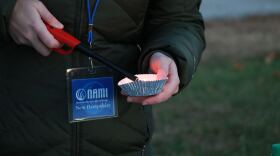Psychiatrists and pediatricians from New England say that children they see in their practice show increased anxiety around climate change.
At a webinar Thursday, hosted by the National Alliance of Mental Illness of New Hampshire and the New Hampshire Health Care Workers for Climate Action, Elizabeth Pinsky, a child, and adolescent psychiatrist and pediatrician at Massachusetts General Hospital, said her family's personal experience with these emotions brought her to study climate change-related anxiety more deeply.
Pinksy recounted that she was consuming too much news on social media and waking up at night worrying about the environment.
“I thought I was doing a good job of keeping that anxiety contained,” she said. But she noticed one day that her kids were feeling that anxiety too.
A 2021 survey of 10,000 young people ages 16 to 25 from the global north and south revealed that 68% feel anxious, 58% angry, 57% powerless, and 51% guilty when it comes to our changing climate.
Pinsky explained that not all youth are equally vulnerable. She said climate change is a threat multiplier that can be a catalyst for other disparities such as structural racism, language barriers and economic inequality.
According to Pinsky, communities in the United States at the greatest risk of climate change, which may result in anxiety, are young people of color, young people with disabilities, and children already living in poverty.
She pointed out that climate change anxiety, rage, or despair are not mental illnesses.
“It means that we care about the planet,” she said. But when that turns into uncontrollable or pathological behavior, that can be a problem for the child.
When it comes to solutions for climate change anxiety, Pinsky recommended that parents talk with their kids, providing accurate information and remaining open to discussion.
She said it’s important not to minimize their thoughts.
“More and more people will be eco-anxious as the crisis deepens, but we want people to engage and not deny it so they can move on and take action,” she said.








